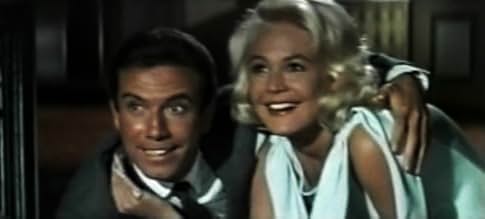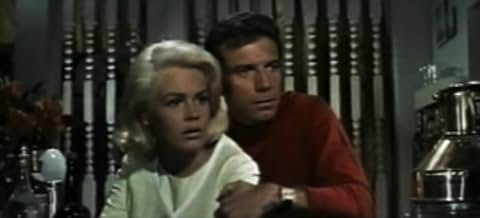Anthony Franciosa(1928-2006)
- Actor
Franciosa was born Anthony Papaleo on October 25, 1928, in New York City. The son of a construction worker and seamstress who divorced when he was a year old, he seldom saw his father after this and never man really got to know the other. After graduating high school, during a visit to a YMCA to take a free dance lesson, Franciosa came across an audition for a play. Intrigued, he auditioned and was offered a part.
Franciosa began acting professionally, taking his mother's maiden name as his stage name, and had his breakthrough in Calder Willingham's play "End as a Man" (1955), which opened off-Broadway at the Theatre de Lys on September 15, 1953 and transferred to Broadway on October 14 after 32 performances. It was directed by Jack Garfein and co-starred Ben Gazzara (who won a Theatre World Award and would appear in the movie version), both of whom were associated with the Actors Studio, as was Franciosa. His first wife, Beatrice Bakalyar, was a writer.
In 1955, he first appeared in the role that would make him famous: "Polo Pope", the brother of a heroin addict, in an Actors Studio workshop production of Michael V. Gazzo's A Hatful of Rain (1957). The production later moved to Broadway, where Franciosa earned an Outer Critics Circle Award and a Tony Award nomination. Hollywood beckoned, and he made his film debut in Robert Wise's This Could Be the Night (1957) with Paul Douglas and Jean Simmons.
He appeared in Actors Studio co-founder Elia Kazan's A Face in the Crowd (1957) before reprising the role of "Polo Pope" in Fred Zinnemann's A Hatful of Rain (1957). Franciosa won an Academy Award nomination for Best Actor in 1958 for "Hatful" and, with his good looks, was a very hot commodity in Hollywood. He followed up his strong debut by starring in a variety of top A-list films, including George Cukor's Wild Is the Wind (1957), Martin Ritt's The Long, Hot Summer (1958) and The Naked Maja (1958), in which he played painter Francisco Jose de Goya, opposite Ava Gardner.
Franciosa's career began to run out of momentum almost as quickly as it had started, as he rapidly developed a reputation as a combative personality, earning him a reputation as "difficult". Although he starred in George Roy Hill's adaptation of Tennessee Williams' Period of Adjustment (1962), by 1964 he was reduced to appearing in a TV series, Valentine's Day (1964), which lasted a single season. In 1968 he was cast as one of three alternating leads in the television series The Name of the Game (1968), a spin-off from the 1966 TV movie Fame Is the Name of the Game (1966) (the first TV-movie ever made as a pilot for a TV series that was subsequently picked up as a series). Although the show was popular with audiences, Franciosa was fired after appearing in the first two seasons; NBC justified giving him the sack because the actor's mercurial temper was causing too many problems on the set. Looking back at his career in a 1996 interview, Franciosa acknowledged that he was too inexperienced to handle sudden stardom. "It was an incredible amount of attention, and I wasn't quite mature enough psychologically and emotionally for it".
He starred in the series Matt Helm (1975), which only lasted one season, but his talent and charm meant he was in demand throughout the five decades of his career, though not in the kinds of roles that characterized the first two decades of his star period. He continued to act in supporting roles in movies and starring roles in TV movies and series until he retired in 1996. He appeared in one last project, "Manifest Mysteries: Coronation" (2006), shortly before his death on January 19, 2006 in Los Angeles, at the age of 77, five days after that of his ex-wife, actress Shelley Winters.
Franciosa began acting professionally, taking his mother's maiden name as his stage name, and had his breakthrough in Calder Willingham's play "End as a Man" (1955), which opened off-Broadway at the Theatre de Lys on September 15, 1953 and transferred to Broadway on October 14 after 32 performances. It was directed by Jack Garfein and co-starred Ben Gazzara (who won a Theatre World Award and would appear in the movie version), both of whom were associated with the Actors Studio, as was Franciosa. His first wife, Beatrice Bakalyar, was a writer.
In 1955, he first appeared in the role that would make him famous: "Polo Pope", the brother of a heroin addict, in an Actors Studio workshop production of Michael V. Gazzo's A Hatful of Rain (1957). The production later moved to Broadway, where Franciosa earned an Outer Critics Circle Award and a Tony Award nomination. Hollywood beckoned, and he made his film debut in Robert Wise's This Could Be the Night (1957) with Paul Douglas and Jean Simmons.
He appeared in Actors Studio co-founder Elia Kazan's A Face in the Crowd (1957) before reprising the role of "Polo Pope" in Fred Zinnemann's A Hatful of Rain (1957). Franciosa won an Academy Award nomination for Best Actor in 1958 for "Hatful" and, with his good looks, was a very hot commodity in Hollywood. He followed up his strong debut by starring in a variety of top A-list films, including George Cukor's Wild Is the Wind (1957), Martin Ritt's The Long, Hot Summer (1958) and The Naked Maja (1958), in which he played painter Francisco Jose de Goya, opposite Ava Gardner.
Franciosa's career began to run out of momentum almost as quickly as it had started, as he rapidly developed a reputation as a combative personality, earning him a reputation as "difficult". Although he starred in George Roy Hill's adaptation of Tennessee Williams' Period of Adjustment (1962), by 1964 he was reduced to appearing in a TV series, Valentine's Day (1964), which lasted a single season. In 1968 he was cast as one of three alternating leads in the television series The Name of the Game (1968), a spin-off from the 1966 TV movie Fame Is the Name of the Game (1966) (the first TV-movie ever made as a pilot for a TV series that was subsequently picked up as a series). Although the show was popular with audiences, Franciosa was fired after appearing in the first two seasons; NBC justified giving him the sack because the actor's mercurial temper was causing too many problems on the set. Looking back at his career in a 1996 interview, Franciosa acknowledged that he was too inexperienced to handle sudden stardom. "It was an incredible amount of attention, and I wasn't quite mature enough psychologically and emotionally for it".
He starred in the series Matt Helm (1975), which only lasted one season, but his talent and charm meant he was in demand throughout the five decades of his career, though not in the kinds of roles that characterized the first two decades of his star period. He continued to act in supporting roles in movies and starring roles in TV movies and series until he retired in 1996. He appeared in one last project, "Manifest Mysteries: Coronation" (2006), shortly before his death on January 19, 2006 in Los Angeles, at the age of 77, five days after that of his ex-wife, actress Shelley Winters.




































